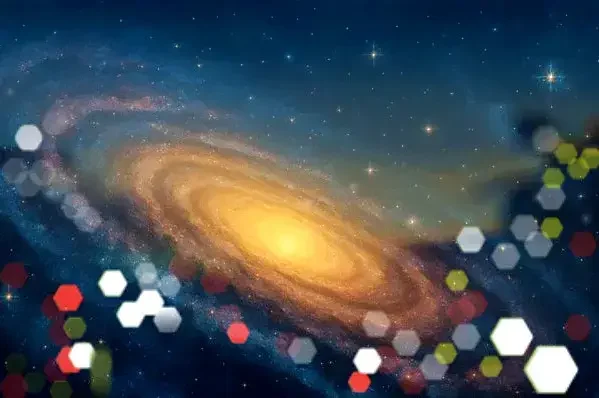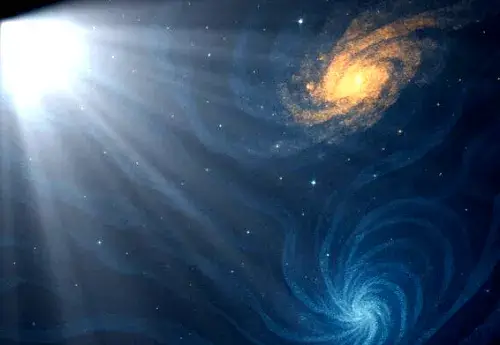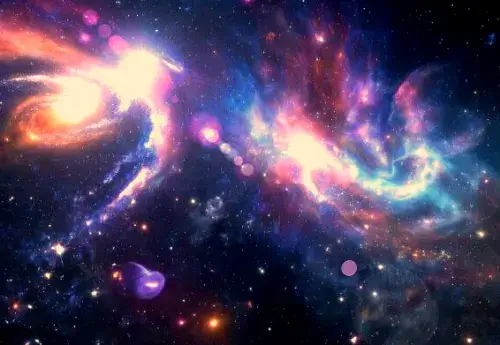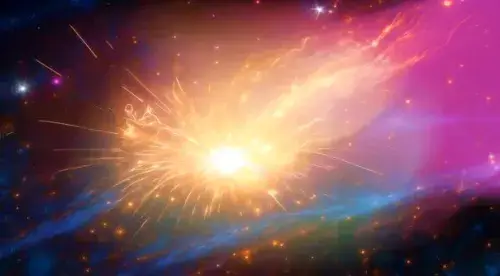Universe Reset. In recent years, physicists and astronomers have been increasingly asking a profound question: is it possible for the universe not to end, but to undergo a kind of “universal reset”?
While this idea sounds like something from a science fiction movie, it’s actually grounded in serious theories and observations.
Modern cosmologists are leaning more and more toward the idea that our universe might not simply fade away but could instead transform into something new entirely.
Some of these hypotheses emerge from a new analysis of the structure of time and matter, while others are based on the latest data about dark energy collected by powerful telescopes and satellites.
This new evidence suggests that the picture of the end of the universe might be far more complex and unexpected than previously thought.
Universe Reset or is Dark Energy in Simple Terms?
Dark energy is a mysterious form of energy that scientists believe permeates all of space and exerts a powerful influence on the expansion of the universe. It’s thanks to dark energy that our universe isn’t just expanding, but doing so at an accelerating rate.
To grasp this, imagine you throw a ball into the air. Due to gravity, it should slow down and eventually fall back to the ground. By analogy, after the Big Bang, gravity should have gradually slowed the expansion of the cosmos.
However, in a groundbreaking discovery in 1998, astronomers found that galaxies weren’t slowing down on the contrary, they were moving away from each other faster and faster.
This meant that something within the universe was “pushing” on space itself, stretching it apart. This mysterious force was named dark energy.
We still don’t know what dark energy is made of, how it works, or if it can be directly detected. It can’t be seen, touched, or measured with conventional instruments.
Yet, according to calculations, dark energy makes up about 68% of all the energy and matter in the universe. This means it’s the most dominant substance in the cosmos, but it remains one of the greatest mysteries of modern science.
Scientists have proposed various explanations, but a definitive theory has yet to be established. What we know for sure is that without dark energy, our universe would behave in a completely different way.
While most scientists accept this, some disagree and believe that dark energy is not a necessary component of the universe’s models.
Why Scientists Think a “Universal Reset” is Possible.
The idea of a universal reset stems from new theories about the behavior of dark energy. Recent observations, such as data from the DESI (Dark Energy Spectroscopic Instrument), suggest that dark energy might not be constant and could be weakening over time.
This could lead to a different fate for the universe than the commonly accepted “heat death.” Instead, it could culminate in a process known as the “Big Crunch.”
In a Big Crunch scenario, the expansion of the universe would eventually halt, and gravity would begin to pull all matter back together. This immense gravitational force would cause the universe to contract, leading to a singularity a state reminiscent of the beginning of the Big Bang.
This is where the concept of a universal “reset” comes from.
The Cyclic Universe and Penrose’s Theory.
The eminent scientist Sir Roger Penrose proposed a bold concept called “conformal cyclic cosmology,” which posits that the universe is made up of a series of repeating “aeons.”
After each aeon of expansion and decay, the universe enters a new phase that culminates in a new Big Bang.
In this model, the universe doesn’t die but simply transitions into its next cycle. This theory has found some support in analyses of the cosmic microwave background (CMB) radiation.
For instance, it could help explain some of the great mysteries that the standard cosmological model struggles with, such as why the early universe had such an incredibly low entropy.
Entropy is a measure of disorder or chaos within a system. The higher the entropy, the greater the disorder. While this term originated in thermodynamics, it has since been used in many other fields, including physics, chemistry, computer science, and even philosophy.
The existence of low-entropy states in the early universe is a key puzzle that a cyclic model might solve.
Other questions that these theories attempt to address include:
• Why haven’t fundamental physical constants changed over time?
• What happens beyond the event horizon of black holes?
Studying these scenarios is crucial for understanding the very structure of time, the nature of gravity, and the fundamental interactions of matter.
What Observations Could Confirm This?
Cutting-edge telescopes and observatories like Euclid, the Vera C. Rubin Observatory, and the Roman Space Telescope are actively collecting data on the structure of the universe and its expansion rate.
By analyzing the cosmic microwave background (CMB) radiation, scientists are searching for traces of possible “previous” universes.
If anomalies are found in the distribution of the CMB such as concentric circles or regions of unusually low entropy it could lend strong support to a cyclic model.
However, it’s still too early to say for sure; scientists are continuing their observations with great interest.
What is the Future of the Universe?
There are many possible scenarios for the universe’s ultimate fate. One is an endless expansion and cooling, leading to “heat death.” Another is a collapse back into a dense point (the Big Crunch). A third involves a “rebound” and a new birth.
A fourth scenario, called the “Big Rip,” suggests that dark energy could eventually tear apart the very fabric of space itself.
Among these, the “reset” scenario through a Big Crunch and rebound seems particularly compelling because it doesn’t require a start from scratch. In this case, the universe simply continues to exist in a different form. However, we still don’t know which of these scenarios is the correct one.
Nevertheless, new observations and theories are gradually coalescing into a new picture, one where the universe doesn’t simply “die” but rather renews itself.
This changes not only our ideas about the future of the cosmos but also our very understanding of time and existence. It’s possible that we’re living not in the first, but in the tenth or hundredth version of the universe we just haven’t learned to recognize it yet.
Have a Great Day!





